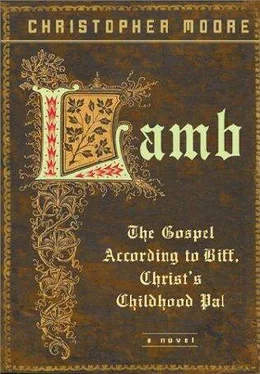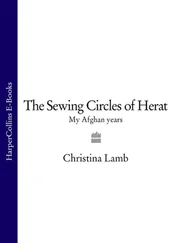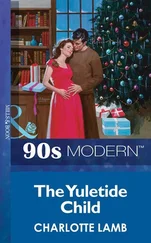“Right. Rumi, am I correct in assuming that these pits, when someone is not living in them, are used for tanning hides?”
“Yes, it is work that only Untouchables may do.”
“That would account for the lovely smell. I assume you use urine in the tanning process, right?”
“Yes, urine, mashed brains, and tea are the main ingredients.”
“Show me the pit where the urine is condensed.”
“The Rajneesh family is living there.”
“That’s okay, we’ll bring them a present. Josh, do you have any lint in the bottom of your satchel?”
“What are you up to?”
“Alchemy,” I said. “The subtle manipulation of the elements. Watch and learn.”
When it was not being used, the urine pit was the home of the Rajneesh family, and they were more than happy to give us loads of the white crystals that covered the floor of their home. There were six in the family, father, mother, an almost grown daughter, and three little ones. Another little son had been taken for sacrifice at the festival of Kali. Like Rumi, and all the other Untouchables, the Rajneesh family looked more like skeletons mummified in brown leather than people. The Untouchable men went about the pits naked or wearing only a loincloth, and even the women were dressed in tatters that barely covered them—nothing as nice as the stylish sari that I had purchased in the marketplace. Mr. Rajneesh commented that I was a very attractive woman and encouraged me to drop by after the next monsoon.
Joshua pounded chunks of the crystallized mineral into a fine white powder while Rumi and I collected charcoal from under the heated dying pit (a firebox had been gouged out of the stone under the pit) which the Untouchables used to render the flowers from the indigo shrub into fabric dye.
“I need brimstone, Rumi. Do you know what that is? A yellow stone that burns with a blue flame and gives off a smoke that smells like rotten eggs?”
“Oh yes, they sell it in the market as some sort of medicine.”
I handed the Untouchable a silver coin. Go buy as much of it as you can carry.”
“Oh my, this will be more than enough money. May I buy some salt with what is left?”
“Buy what you need with what’s left over, just go.”
Rumi skulked away and I went to help Joshua process the saltpeter.
The concept of abundance was an abstract one to the Untouchables, except as it pertained to two categories, suffering and animal parts. If you wanted decent food, shelter, or clean water, you would be sorely disappointed among the Untouchables, but if you were in the market for beaks, bones, teeth, hides, sinew, hooves, hair, gallstones, fins, feathers, ears, antlers, eyeballs, bladders, lips, nostrils, poop chutes, or any other inedible part of virtually any creature that walked on, swam under, or flew over the subcontinent of India, then the Untouchables were likely to have what you wanted lying around, conveniently stored beneath a thick blanket of black flies. In order to fashion the equipment I needed for my plan, I had to think in terms of animal parts. Fine unless you need, say, a dozen short swords, bows and arrows, and chain mail for thirty soldiers and all you have to work with is a stack of nostrils and three mismatched poop chutes. It was a challenge, but I made do. As Joshua moved among the Untouchables, surreptitiously healing their maladies, I barked out my orders.
“I need eight sheep bladders—fairly dry—two handfuls of crocodile teeth, two pieces of rawhide as long as my arms and half again as wide. No, I don’t care what kind of animal, just not too ripe, if you can manage it. I need hair from an elephant’s tail. I need firewood, or dried dung if you must, eight oxtails, a basket of wool, and a bucket of rendered fat.”
And a hundred scrawny Untouchables stood there, eyes as big as saucers, just staring at me while Joshua moved among them, healing their wounds, sicknesses, and insanities, without any of them suspecting what was happening. (We’d agreed that this was the wisest tack to take, as we didn’t want a bunch of healthy Untouchables athletically bounding through Kalighat proclaiming that they had been cured of all ills by a strange foreigner, thus attracting attention to us and spoiling my plan. On the other hand, neither could we stand there and watch these people suffer, knowing that we—well, Joshua—had the power to help them.) He’d also taken to poking one of them in the arm with his finger anytime anyone said the word “Untouchable.” Later he told me that he just hated passing up the opportunity for palpable irony. I cringed when I saw Joshua touching the lepers among them, as if after all these years away from Israel a tiny Pharisee stood on my shoulder and screamed, “Unclean!”
“Well?” I said after I’d finished my orders. “Do you want your children back or not?”
“We don’t have a bucket,” said one woman.
“Or a basket,” said another.
“Okay, fill some of the sheep bladders with rendered fat, and bundle the wool in some kind of hide. Now go, we don’t have a lot of time.”
And they all stood and looked at me. Big eyes. Sores healed. Parasites purged. They just looked at me. “Look, I know my Sanskrit isn’t great, but you do know what I am asking?”
A young man stepped forward. “We do not want to anger Kali by depriving her of her sacrifices.”
“You’re kidding, right?”
“Kali is the bringer of destruction, without which there can be no rebirth. She is the remover of the bondage that ties us to the material world. If we anger her, she will deprive us of her divine destruction.”
I looked at Joshua across the crowd. “Do you understand this?”
“Fear?” he said.
“Can you help?” I asked in Aramaic.
“I’m not good at fear,” Joshua said in Hebrew.
I thought for a second as two hundred eyes pinned me to the sandstone on which I stood. I remembered the red-stained gashes on the wooden elephant statues at the altar of Kali. Death was their deliverance, was it?
“What is your name?” I asked the man who had stepped out of the crowd.
“Nagesh,” he said.
“Stick out your tongue, Nagesh.” He did, and I threw back the cloth that covered my head and loosened it around my neck. Then I touched his tongue.
“Destruction is a gift you value?”
“Yes,” said Nagesh.
“Then I shall be the instrument of the goddess’s gift.” With that I pulled the black glass dagger from the sheath in my sash, held it up before the crowd. While Nagesh stood, passive, wide-eyed, I drove my thumb under his jaw, pushed his head back, and brought the dagger down across his throat. I lowered him to the ground as the red liquid spurted over the sandstone.
I stood and faced the crowd again, holding the dripping blade over my head. “You owe me, you ungrateful fucks! I have brought to your people the gift of Kali, now bring me what I ask for.”
They moved really quickly for people who were on the edge of starvation.
After the Untouchables scattered to do my bidding, Joshua and I stood over the bloodstained body of Nagesh.
“That was fantastic,” Joshua said. “Absolutely perfect.”
“Thanks.”
“Had you been practicing all that time we were in the monastery?”
“You didn’t see me push the pressure point in his neck then?”
“No, not at all.”
“Gaspar’s kung fu training. The rest, of course, was from Joy and Balthasar.”
I bent over and opened Nagesh’s mouth, then took the ying-yang vial from around my neck and put a drop of the antidote on the Untouchable’s tongue.
“So he can hear us now, like when Joy poisoned you?” Joshua asked.
I pulled back one of Nagesh’s eyelids and watched the pupil contract slowly in the sunlight. “No, I think he’s still unconscious from me holding the pressure point. I didn’t think the poison would work quickly enough. I could only get a drop of poison on my finger when I loosened my sari. I knew it would keep him down, I just wasn’t sure it would put him down.”
Читать дальше










